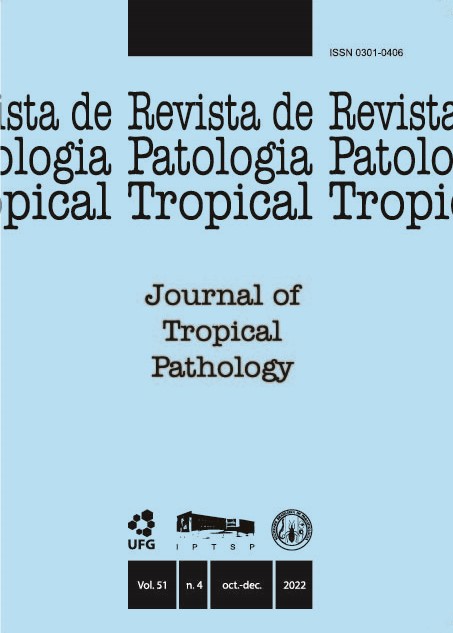Occurrence of parasites in the soil of public squares in Veranópolis, Rio Grande do Sul, Brazil
DOI:
https://doi.org/10.5216/rpt.v51i4.73348Resumo
Human health is threatened by diseases transmitted between animals and humans, denominated zoonoses. Public parks and squares are environments used by the population and easily accessed by domestic and stray animals. The contact of dogs and cats with the soil from those places may favor the transmission of zoonoses to humans. This study aimed to determine the occurrence of parasites in the soil of public squares in the city of Veranópolis in Rio Grande do Sul State. Forty sand samples were collected in four squares throughout the months of December 2021, January, February and March 2022. The samples were processed by the Hoffman, Pons and Janer (HPJ) and Rugai methods. The results showed that 32.5% (13/40) of samples were positive for the presence of parasitic structures. Nematode larvae, including hookworm, were the most prevalent parasitic structures in the samples. In addition, Capillaria sp. eggs, Strongyloides sp. larvae, free-living larvae and Entamoeba coli cysts were also found. Two collections conducted after rainy days had a higher rate of contamination. The presence of parasites was observed in both superficial and deep samples. Therefore, the presence of parasites in the sand of Veranópolis’ public squares demonstrates that there is a risk of parasitic infection for the local population.
KEY WORDS: Animals; parasites; soil; squares; zoonoses.
Downloads
Downloads
Publicado
Como Citar
Edição
Seção
Licença
The manuscript submission must be accompanied by a letter signed by all authors stating their full name and email address, confirming that the manuscript or part of it has not been published or is under consideration for publication elsewhere, and agreeing to transfer copyright in all media and formats for Journal of Tropical Pathology.

